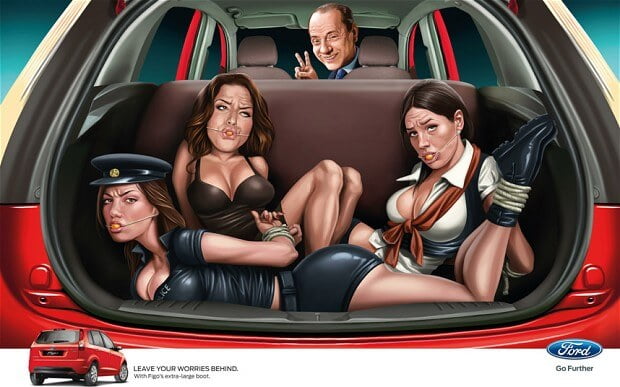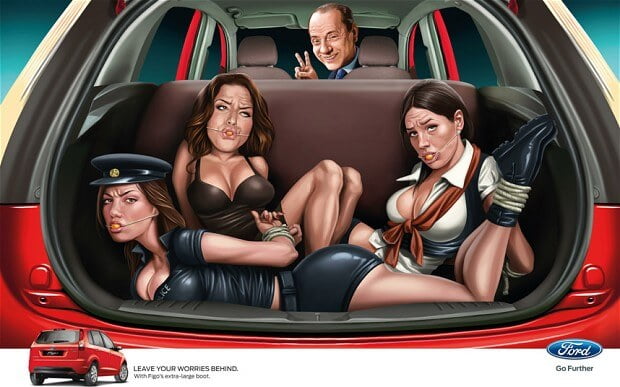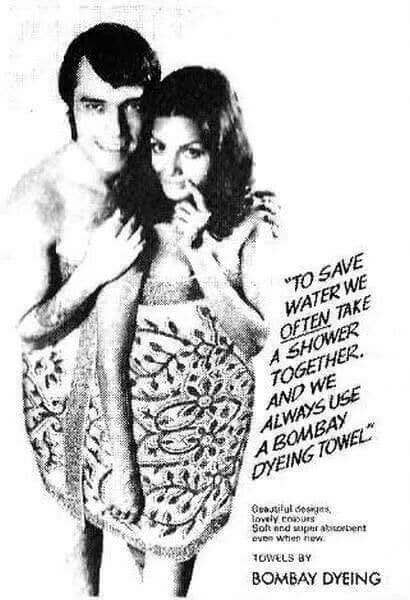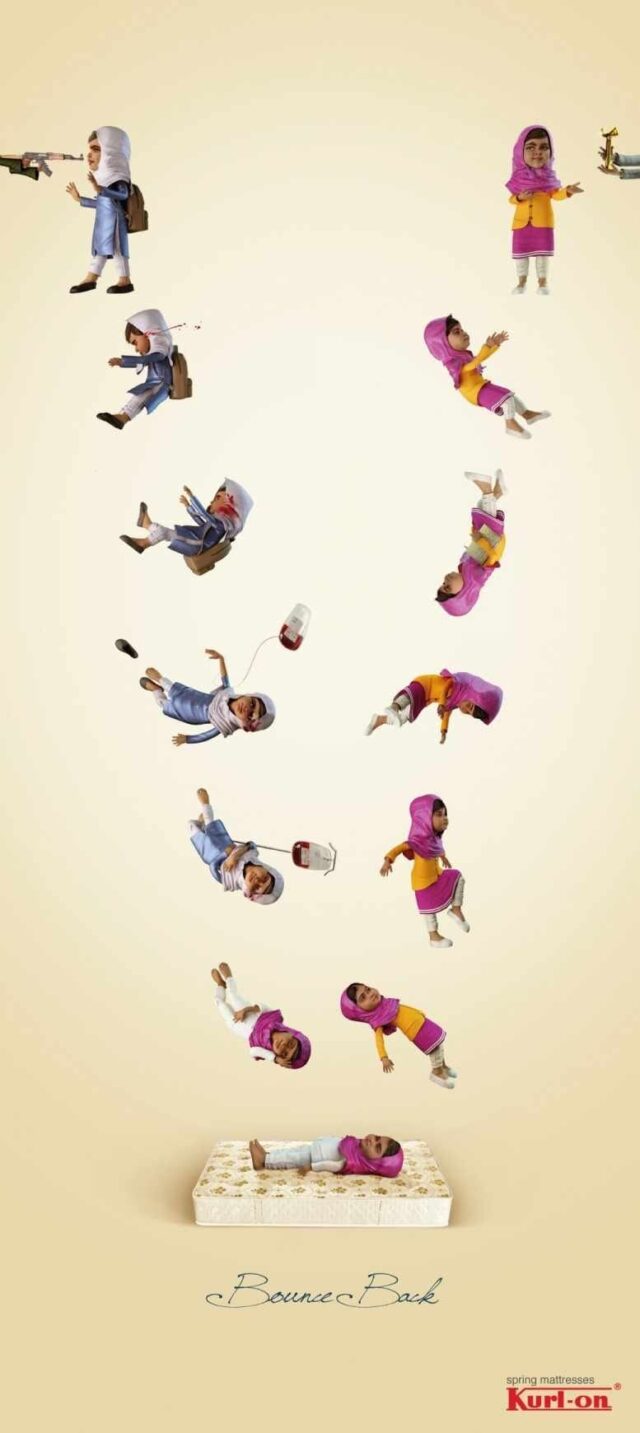“Nobody reads ads. People read what interests them. Sometimes it’s an ad.” – Howard Gossage
Advertisements are one of the most influential forms of media, considering we see an ad thrown at us every 2 seconds of our goddamn life. The Indian advertising industry is one of the most entertaining, sensitive, creative and absurd ones out there.
But once in a while, an ad comes which breaks all moral norms. Sometimes, the creators, in the spirit of making the ad more impactful, go a bit too far thus invoking outrage and controversies all around it. And ironically, these ads make it into the news and debates and become successful.
Let’s look at some such advertisements-
1. Boot-space so big that one can easily fit half-clothed and gagged women there! Amazing idea Ford Figo!
The ad featured cartoons of scantly-clothed women in binds with their mouths gagged. The driver resembles Italy’s former Prime Minister, Silvio Berlusconi, who was infamous for throwing “sex” parties. He was also involved in cases related to underage sex trafficking.
The ad was considered extremely distasteful as most Indians are unaware who Berlusconi is and is promoting violence against women.

2. When Mahindra showed their topless models without using topless models!
This Mahindra Jeep advertisement came out in 1996, making the Jeep extremely popular. The creative use of words without actually using “Topless models” grabbed the attention of the target audience. The ad stirred controversy for using sex appeal to sell Jeeps.
3. Apparently sexism and fashion go hand-in-hand!
This 2016 ad, of the Danish men’s fashion brand Jack and Jones, featured Ranveer Singh hanging a woman on his shoulder, implying that women are just objects and should be treated as “work”.
Viewers called out the brand for promoting sexism and the actor for being part of the ad. Later, Ranveer Singh confessed that he regret doing the ad and said, “We got it wrong.”
He continued, “It was important to give the brand creative freedom while designing their campaign, but I guess we got it wrong on one of those billboards and I’m sorry this happened but it’s a thing of the past….”
He further added, “We rectified it immediately by having those hoardings taken down asap [sic] from everywhere over 30 cities overnight. I treat all women with the utmost respect both professionally and personally and would never do anything to disrespect them.”
4. Even in 21st Haryana government’s pride is its fully covered women!
This Haryana government’s 2017 ad was met with a lot of backlash especially from women across the country. Wrestler Geeta Phogat heavily condemned the ad and said that this is reflective of the mindset that does not let girls come out of the veil. Eventually, the Haryana government issued an apology for the ad.
Read More: These Latest Brand Ads Made During Coronavirus Lockdown Are Sensitive And Sensible
5. Bombay Dyeing’s vivacious 1980s ad on water conservation
This very infamous ad of Bombay Dyeing, featuring Sharmila Tagore and a male model wrapped in a Bombay Dyeing towel, cheekily smiling at the camera, cleverly succeeds in achieving the brand’s corporate social responsibility by referring towards water conservation.
The ad, which came in the 1980s, hit headlines as conversations like female sexuality, sex, empowerment and gender issues were not promoted. Nevertheless, constant objectification of the human bodies and sexualising content as a marketing strategy is still deprecating.
6. Delhi police dropping bomb as usual!
This ad was published in 2014 due to the growing trend of holding dharnas in the capital at the time. According to Delhi Police officials, “the protesters, in most cases, do not listen to us and make it appear like we are trying to curb their fundamental right to protest. They do not understand that we can only allow a limited space as the law and order situation in the area cannot be compromised.”
Police said that any protest without authorisation will be seen as an “encroachment”.
“We just hope that the people take this advertisement in the right spirit,” the officer said.
7. Yes Kurl-On, Malala should dedicate the Nobel prize to you for this!
This ad by Ogilvy & Mather (O&M) for the mattress brand Kurl-On, created a lot of controversies. The ad titled, “Bounce Back” was hated publically for using a horrible tragedy to market a product.
An O&M spokesman said, “We deeply regret this incident and want to personally apologise to Malala Yousafzai and her family. We are investigating how our standards were compromised in this case and will take whatever corrective action is necessary.”
The ad which was only released online was taken down immediately.
8. Delhi police pre-assuming that all street children, if not intervened, will go on chopping heads is quite a stretch
This Delhi Police ad of 2013 got heavily into controversy as it encouraged readers to prevent street children from “chopping heads” by teaching them “how to chop onions.”
The Delhi Police’s insensitive use of words like “rescue” street children from “chopping heads” to “chop onions” endorse child labour.
The advertisement pulled intense criticism for ignorantly re-imposing stereotypes about street children by stigmatising them as possible criminals.
It’s up to to you to judge if such ads should be “allowed” or not. But it will be foolish to ignore the fact that these ads did successfully invoke interest among the Indian viewers!
Image Sources: Google Images
Sources: NDTV, Huffington Post, Trak.in and more
Find Blogger: @aditi_21gupta
This post is tagged under: Advertisements, media, Indian advertising industry, Indian, India, Howard Gossage, moral, moral norms, Bombay Dyeing, Mahindra, topless models, water conservation, sexism, fashion, Haryana government, Ford Figo, Delhi police, Kurl-on, Malala Yousafzai, Nobel prize, Ranveer Singh, child labour, Ogilvy & Mather, Sharmila Tagore, Geeta Phogat, Jack and Jones, Silvio Berlusconi, controversial indian ads, bad ads, abusive ads, sexist ads, reported ads india, cheap, shocking indian ads
Other Recommendations:
Amul Is Playing Their 90’s TV Ads During Ramayana On DD By Popular Demand










































